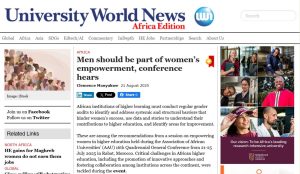
Men Should be Part of Women’s Empowerment – AAU 16th General Conference Feature by the University World News*
https://www.universityworldnews.com/post.php?story=20250817181121899
The ‘Empowering women in higher education’ session, moderated by Professor Sunungurai Dominica Chingarande, the vice-chancellor of the Women’s University in Africa, focused on women’s contributions to higher education and issues of equality and equity. It also explored the challenges women face in accessing and retaining leadership positions. Participants worked on strategies for an environment that allows women leaders to thrive.
In her contribution to the session, Professor Puleng LenkaBula, the principal and vice-chancellor of the University of South Africa, emphasised breaking barriers to excellence. LenkaBula said institutions should stop trying to “fix women” and, instead, fix the systems that should encourage and support them.
Professor Smaranda Olarinde, vice-chancellor at Afe Babalola University in Ekiti State, Nigeria, and a board member of the Association of African Universities, emphasised the importance of male engagement in promoting women’s empowerment. She said that men’s active involvement and support are essential to create a more inclusive environment. “By working together, men and women can drive meaningful change and foster a culture of mutual respect and understanding.”
Professor Nana Aba Appiah Amfo, the vice-chancellor of the University of Ghana, highlighted the importance of using data and stories to understand women’s contributions to higher education. This message was adopted as one of the session’s key recommendations. Amfo also emphasised the need for institutions to be intentional about promoting women’s empowerment and leadership.
The newly elected AAU Governing Board President, Professor Kenneth Matengu (the vice-chancellor of the University of Namibia), also attended the women’s session, demonstrating his commitment to and interest in advancing the cause of women in higher education.
Dr Felicia Nkrumah Kuagbedzi, a founding member of the African Women in Higher Education Network (WoHEN), said systemic change is needed to dismantle barriers for institutions to reach their full potential.
“Advancing women’s leadership in African higher education is not just about equity – it is a strategic necessity for innovation. To unlock the full potential of our institutions, we must drive systemic change to dismantle barriers, embed mentorship to cultivate confidence, and ensure male allyship is proactive, she said.